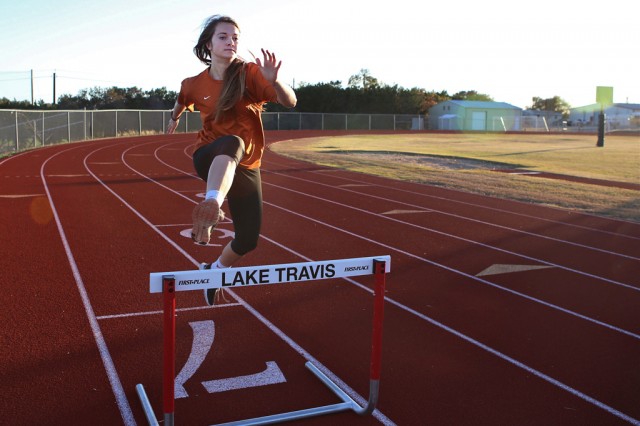A Heart Like Hannah’s

University of Texas at Austin freshman Abby Moss was diagnosed with the same genetic heart disorder that killed her sister. She no longer can run for the UT track team. But she occasionally still runs at a leisurely pace at Lake Travis High School. Photo by Thalia Juarez/Reporting Texas
By Mary Margaret Johnson
For Reporting Texas
A routine test may help Abby Moss and her family live with the heart condition that killed her sister.
Abby arrived at the University of Texas at Austin this fall to run hurdles for the track team. She felt strong and fit and ready to compete. But in August, just before her first day of college, she underwent a routine physical for athletes.
UT doctors discovered she had Long QT Syndrome, a genetic disorder that causes irregular heartbeats.
It was the same disorder that had killed her older sister, Hannah, just months earlier.
On March 18, Janet Moss tried to call her daughter Hannah, a 20-year-old sophomore track athlete at Southern Methodist University. The mother started to worry because Hannah would not answer. They had talked on the phone the night before. She had sounded fine.
Janet called Dallas police, who found Hannah’s body in her apartment. The autopsy showed that she had died in her sleep of a cardiac arrest caused by undiagnosed Long QT Syndrome. The death came as a shock to everyone, especially Abby.
“Hannah was my best friend,” Abby said. “It was so surprising when they told me I had the same disease, because it is so rare.”
The family is still working through their loss, especially as they face their first holiday season without her.
Doctors could have started treatment right away had they detected the disorder – which is what happened to 18-year-old Abby in August, two days before her first day of her freshman year of college.
“I had to go to the doctor and they surgically implanted a defibrillator in my heart the next day,” Abby said. “Basically, if I go into cardiac arrest, it will shock me back to life.”
The defibrillator is the only treatment Abby needs for now. It ensures that her heart keeps working so that she can live a normal life and continue to do the things that she loves.
Except collegiate track.
Abby’s coaches told her that was no longer an option when she returned to practice after her surgery. Because of concerns over her health, the coaches couldn’t allow her to practice or compete. She could still feel like part of the team by attending regular team meetings.
UT is honoring her scholarship and she plans to cheer on her teammates during their meets in the spring. She just can’t participate in strenuous physical activity such as running.
Dr. Gerald Sioco, a cardiologist in San Antonio who researches heart diseases, said the effects of Long QT are triggered by stressful situations, both emotionally and physically. Running track was out of the question.
“Once one has been diagnosed with Long QT Syndrome and has had an event, like fainting or cardiac arrest, avoidance of strenuous exercise is recommended,” Sioco told Reporting Texas.
Long QT disrupts the electrical signal that make the heart pump blood. That can be fatal if the heart fails to circulate enough oxygen-rich blood through the body.
The genetic disorder affects about one in 5,000 people. Once Abby was diagnosed, a cardiologist tested the rest of her family. Janet also tested positive and got a defibrillator as well. The test for Logan Jr., Abby’s brother, showed some irregularities but doctors ruled out Long QT.
Abby’s father was the only member of the family whose tests were negative.
“It was quite stunning at first when Abby was diagnosed. We hadn’t even heard of Long QT Syndrome until Hannah,” the elder Logan said.
Despite all their years of playing sports and annual physicals, the girls’ heart condition never was detected. Hannah had passed out on more than one occasion during track practice during her freshman year at SMU, her family said. She saw a cardiologist, but her condition went undetected.
“About 10 to 15 percent of people with the disease show a normal QT on an EKG,” said Sioco, the heart researcher.
“Sometimes if you aren’t specifically looking for an abnormality, it can go undetected.”
But an EKG did discover Abby’s condition.
Randall Edwards, the girls’ former track coach at Lake Travis High School, said the fact that the condition went undetected for so many years is a scary thought.
“What happened to Hannah, that could have happened when they were at Lake Travis,” Edwards said. “For athletes like those two girls, and the way they ran, you would have never imagined there was a problem.”
Abby is relieved that doctors detected her condition and that it was treated before anything happened to her.
“I joined a sorority, like Hannah did at SMU, so that’s been taking up a lot of my time,” she said. “And I still get the benefits that go along with being an athlete, even though I’m technically not one anymore. So right now, I’m just having a normal college experience.”
She knows she will never get to run for UT, on the same track where she competed at the high school state meet in May.
But now she has a better chance at a long life – the one her sister might have had.